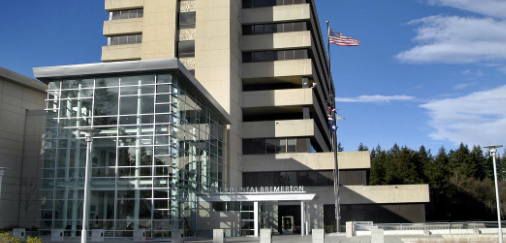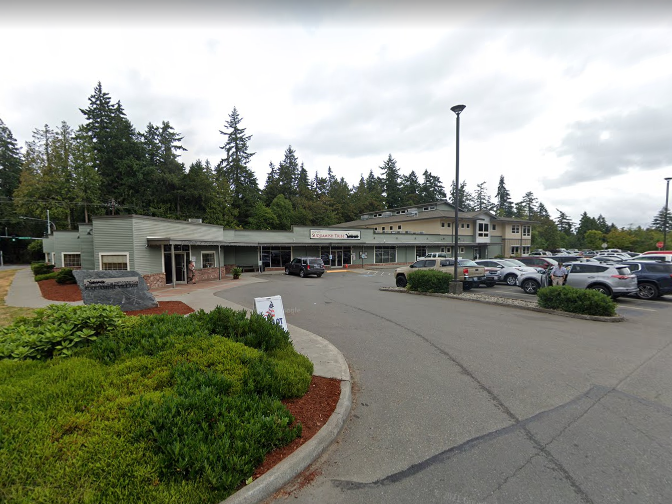Naval Hospital Bremerton

Contact Details
-
Name:Naval Hospital Bremerton
-
Address:1 Boone Road
Bremerton, WA - 98312 -
Phone:360-475-5350
-
Email:
-
Website:
Description
There are currently state and federally funded or sponsored drug and alcohol treatment centers in the state of Washington
Questions & Answers
Help others like you find out more about Naval Hospital Bremerton. Do you know the answers to any of these questions? Contribute now and help others like you.
What kinds of care do they offer?
-
Substance use treatment
Refers to a broad range of activities or services, including identification of the problem (and engaging the individual in treatment); brief interventions; assessment of substance abuse and related problems including histories of various types of abuse; diagnosis of the problem(s); and treatment planning, including counseling, medical services, psychiatric services, psychological services, social services and follow-up for persons with alcohol or other drug problems (Institute of Medicine, 1990).
What specific pharmacotherapy treatments do they provide?
-
Naltrexone (oral)
-
Medication for mental disorders
What types of opioid treatment do they provide?
-
Does not treat opioid use disorders
What types of treatment approaches do they offer?
-
Cognitive behavioral therapy
Involves recognizing unhelpful patterns of thinking and reacting, and then modifying or replacing these with more realistic or helpful ones. The therapy can be conducted with individuals, families, or groups, and clients are generally expected to be active participants in their own therapy.
-
Substance use disorder counseling
A short-term treatment that has been generalized for a variety of disorders including opiate drug dependence and cocaine abuse. The therapy includes supportive techniques which encourage the patient to discuss personal experiences, and expressive techniques, which enable the patient to work through interpersonal relationship issues and gain greater self-understanding.
-
Trauma-related counseling
Cognitive behavior techniques adapted for clients suffering from post-traumatic stress disorder (PTSD) and other effects of abuse and trauma.
-
Brief intervention
A short-term intervention, usually one to five sessions, for substance abusers who are not yet dependent.
-
Contingency management/motivational incentives
Often used in the treatment of drug and alcohol abuse, the approach employs a positive-reinforcement treatment method in which patients are given rewards for constructive actions taken toward their recovery.
-
Motivational interviewing
A counseling approach which acknowledges that many people experience ambivalence when deciding to make changes. Its aim is not to focus immediately on the action of changing, but to work to enhance motivation to change.
-
Anger management
Uses strategies to address the anger cycle, conflict resolution, assertiveness skills, and anger-control plans. The goal of anger management is to reduce both emotional feelings and the physiological arousal that anger causes.
-
Relapse prevention
A cognitive behavioral therapy developed for the treatment of problem drinking and adapted later for cocaine addicts. Cognitive behavioral strategies are based on the theory that learning processes play a critical role in the development of maladaptive behavioral patterns. Individuals learn to identify and correct problematic behaviors. Relapse prevention encompasses several cognitive behavioral strategies that facilitate abstinence as well as provide help for people who experience relapse.
-
Smoking permitted in designated area
A designated area in which smoking is permitted.
What type of setting is this location?
-
Outpatient
Describes patients who receive treatment services without an overnight stay at a treatment facility or hospital.
-
Outpatient day treatment or partial hospitalization
-
Intensive outpatient treatment
-
Regular outpatient treatment
What type of hospital is this?
-
General Hospital (including VA hospital)
A hospital in which patients with many different types of ailments are given care.
Who is responsible for the operation of this facility?
-
Department of Defense
Responsible for providing the military forces needed to deter war and protect the security of our country.
-
Federal Government
What types of license or certifications or accreditation does this facility posses?
-
State department of health
-
The Joint Commission
An independent, not-for-profit group in the United States that administers voluntary accreditation programs for hospitals and other healthcare organizations.
What types of payment or funding do they accept?
-
Federal military insurance (e.g., TRICARE)
What specific groups are treated here?
-
Active duty military
Facility has a program or group specifically tailored for active duty military persons.
What types of screening and assessment methods are used here?
-
Screening for tobacco use
Determines a client's use of tobacco products, such as cigarettes, cigars, pipe tobacco, or smokeless tobacco. It is generally recommended that providers screen for tobacco use on a regular basis by asking clients, as they are seen, about their current and past use of tobacco products and their exposure to secondhand smoke or tobacco.
-
Comprehensive mental health assessment
An examination used to ascertain whether or not a patient is functioning on a healthy psychological, social, or developmental level. It can also be used to aid diagnosis of some neurological disorders, specific diseases, or possible drug abuse.
-
Comprehensive substance use assessment
-
Interim services for clients
-
Screening for mental disorders
Test to determine whether a person is experiencing symptoms of mental health conditions and needs treatment.
-
Screening for substance use
Test to determine whether a person is experiencing symptoms of substance use and needs treatment.
What ancillary services are offered at this facility?
-
Suicide prevention services
Include identifying risk factors; educating staff on identifying the signs of suicidal behavior and using methods to detect risk; and the assessment, intervention, and management of suicidal patients including treatment of an underlying mental or substance use disorder, and use of psychotropic medication, supportive services, and education. Hotlines help individuals to contact the nearest suicide prevention mental health provider.
-
Mental health services
Assessment, diagnosis, treatment or counseling in a professional relationship to assist an individual or group in alleviating mental or emotional illness, symptoms, conditions or disorders.
-
Transportation assistance
What kinds of education and counseling services are offered here?
-
Smoking/vaping/tobacco cessation counseling
Includes interventions for persons who use tobacco and want help with stopping, including behavioral support or counseling in groups or individually.
-
Individual counseling
Process through which clients work one-on-one with a trained mental health clinician in a safe, caring, and confidential environment.
-
Group counseling
Form of therapy where people with similar experiences/issues come together with a professional therapist.
-
Substance use disorder education
What genders are accepted here?
-
Female
-
Male
What kinds of transitional services do they provide if any?
-
Aftercare/continuing care
-
Discharge Planning
A process that aims to improve the coordination of services after discharge from the hospital by considering the patient?s needs in the community.
-
Naloxone and overdose education
-
Outcome follow-up after discharge
What types of testing do they offer?
-
Breathalyzer or blood alcohol testing
A device for estimating blood alcohol content (BAC) from a breath sample.
-
Drug or alcohol urine screening
Analyzes your urine for the presence of certain illegal drugs and prescription medications.
-
Metabolic syndrome monitoring
What opioid medications are used in treatment?
-
Naltrexone used in Treatment
What types of alcohol abuse treatment are available at this facility?
-
This facility administers/prescribes medication for alcohol use disorder
Who provides the medication used in alcohol abuse treatment?
-
In-network prescribing entity
What types of recovery support services are offered here?
-
Recovery coach
Are provided by mental health consumers and include mental health treatment or support services, such as social clubs, peer-support groups, and other peer-organized or consumer-run activities (e.g., consumer satisfaction evaluations of mental health treatment).
Is vaping allowed at this facility?
-
Vaping permitted in designated area
How do I apply for admission at this location?
Have you been to this facility? What was your experience?
Is there a wait-list for treatment center?
Is any payment required?
Related Posts
Suquamish Tribe Wellness
- Suquamish, WA
- 11.10 miles away

